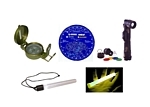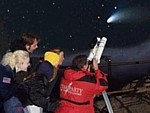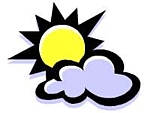Consider some accessories [????????]
Although it is not mandatory to have them, they can greatly facilitate observation; first of all a red light flashlight, or a normal flashlight covered with red cellophane paper: they do not affect sensitivity to darkness and allow you to quickly consult a notebook or map; a green laser (although a little expensive), it is very useful for pointing stars and helping to locate constellations, since its range is a couple of kilometers; a celestial planisphere helps us quickly situate ourselves in the sky of a specific night; a compass It helps us in the basic orientation of cardinal points; and a notebook, to make notes and drawings.
Choose to observe in company [????????]
Especially in observations outside the city, it is highly recommended, because on the one hand it implies greater security and mutual support in case of any emergency, it also means technical support in terms of assembling the instruments, checking accessories and things like that, apart from be fundamental in observations that require separate records of the same phenomenon (e.g. determining the Zenith Hourly Rate of a meteor shower); Observations in general are more enjoyable in the company of other fans, star party style.
Check the weather beforehand [????????]
Weather conditions are largely the most important factor in deciding whether or not to make an observation. It is always a good idea to check at least a couple of days before, online or with the local meteorology office, the conditions for the planned observation site. It is never good to find yourself with fog obscuring your vision, or too intense cold, or very strong winds; Not to mention a completely cloudy sky or torrential rain with a storm. Better to postpone the observation and spend that night lying on the couch watching a good movie!

